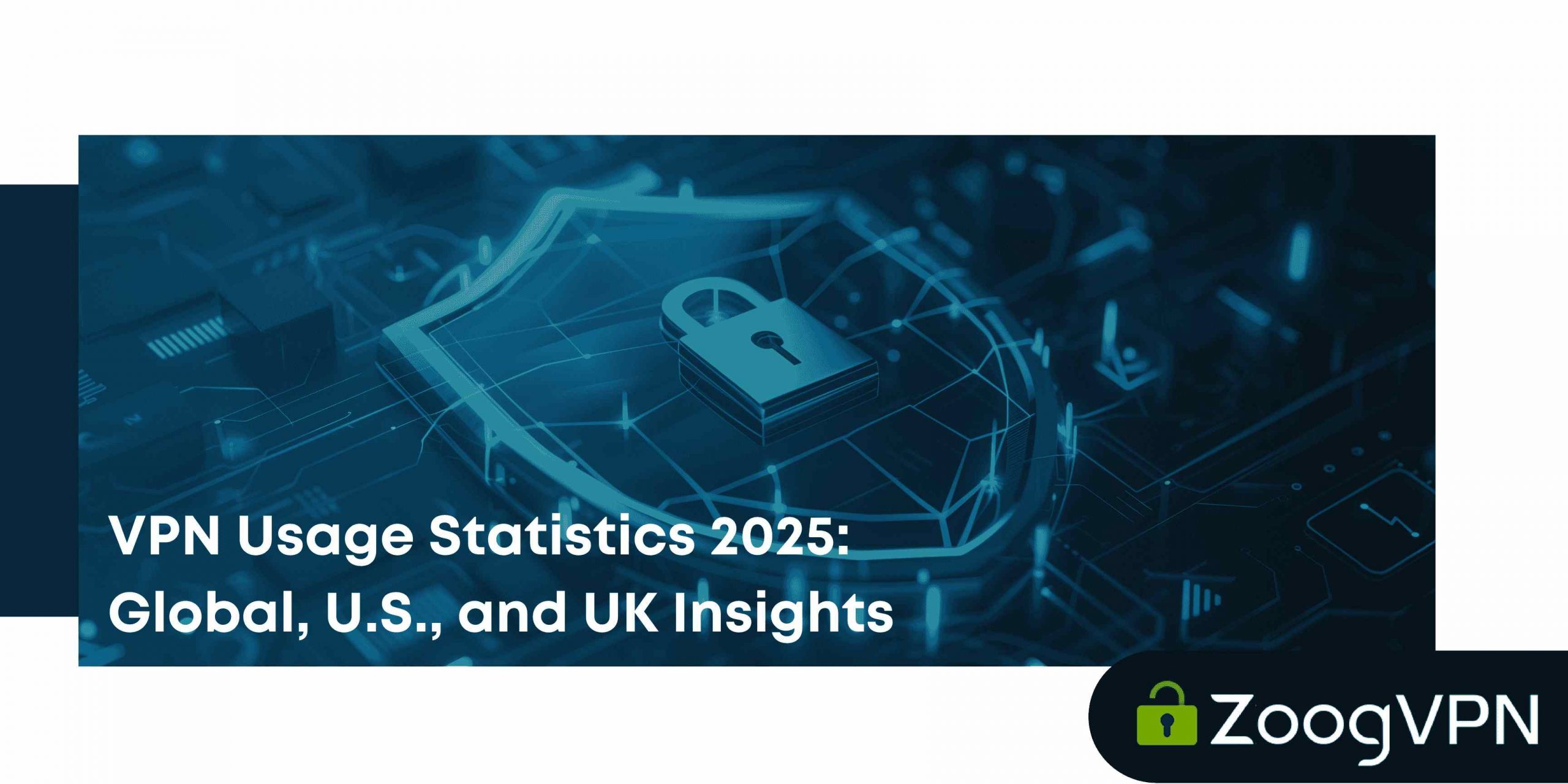Roughly one in three internet users worldwide now use a VPN in 2025 – proof that VPNs have gone far beyond just the domain of privacy-obsessed techies or region-hopping streamers. Today, VPNs serve a much broader purpose: they help secure sensitive data on public Wi-Fi, fight government censorship, protect against ISP tracking, and even stop websites from fingerprinting your device or location.
What has provoked the surge? The biggest driver is growing concern over personal data privacy; users are wary of how much information companies, advertisers, and even governments collect about them online. Alongside this, the rise in data breaches, aggressive advertising trackers, global surveillance, and regional content restrictions have fueled today’s active adoption of VPNs.
In this article, we’re diving into the latest numbers on VPN usage, trends shaping the industry, where VPNs are most popular, and why tools like ZoogVPN are becoming an everyday essential.
VPN Popularity Over Time
Apparently, VPNs didn’t come into wide use overnight. Google Trends shows steady VPN adoption rate growth since 2010, with big spikes, tightly connected with the global events. Each of these moments triggered a behavior shift. As a result, every time digital freedom takes a hit, VPN usage surges.
2020
The COVID-19 pandemic pushed remote work into the mainstream. Suddenly, millions of people were handling sensitive work data over home routers and public Wi-Fi in coffee shops. VPNs became integral for connecting to company servers from outside corporate firewalls.
2022
Political unrest and crackdowns in countries like Russia and Iran drove people to find ways around censorship. Here, VPNs were heavily employed for accessing news, social media, and communication tools that were otherwise blocked.
2024–2025
A global rise in cyberattacks, ransomware campaigns, and regional content blocks (especially across streaming and gaming platforms) is pushing more users toward VPNs. For some, it’s about securing their credentials; for others, it’s about coping with new digital borders.
The Global VPN Market in 2025
The VPN industry is a truly booming global market today. The steady rise of cybercrime, online surveillance, and digital restrictions has created strong demand for these tools. Looking at the worldwide market size and adoption rates gives us a sense of how VPNs are evolving into a mainstream technology rather than just a niche security product.
- The global VPN software market was valued at USD 2.45 billion in 2024 and is projected to grow rapidly, reaching USD 9.41 billion by 2033 at a 16.2% CAGR. (Business Research Insights)
- By 2025, 1.75 billion people worldwide – about one-third of all internet users – are estimated to use VPNs. (Forbes)
VPN Server Software Market
The VPN server software market is experiencing rapid growth, with the global demand for secure and private internet connections. Valued at approximately USD 2.09 billion in 2024, it is projected to grow to around USD 7.04 billion by 2033, representing a CAGR of about 16.2%. (Business Research Insights)
Regional Growth
North America currently holds the largest revenue share, while the Asia Pacific region is the fastest-growing market, supported by expanding internet access, rising cybersecurity awareness, and increased enterprise adoption.
User Base
Corporate users dominate the market, reflecting their critical need for secure enterprise networks. Meanwhile, personal VPN users are the fastest-growing segment due to increasing privacy concerns. 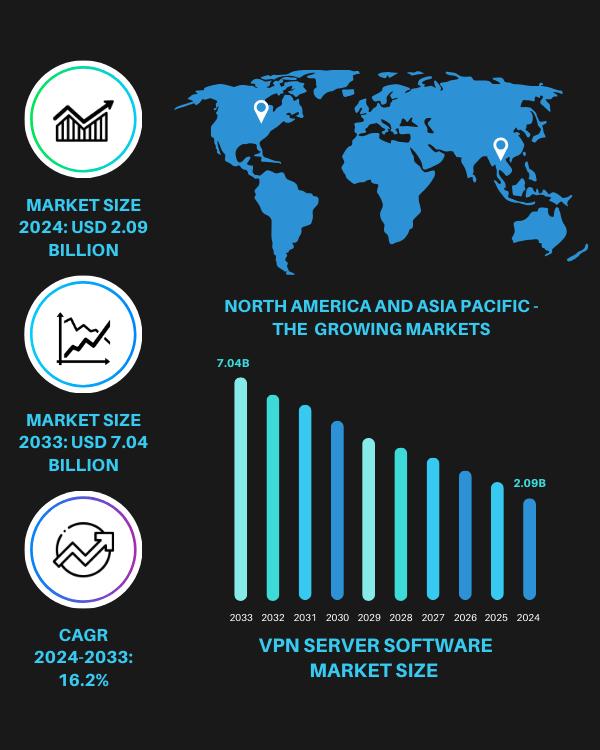
VPN Usage in the United States
According to Security,org, between 2021 and 2023, VPN adoption in the U.S. hovered around 10% for combined personal and business use, while personal-only usage peaked at 23% in 2023. By 2025, however, usage declined overall: only 7% of adults used VPNs across both personal and business devices, and a striking 68% reported not using or being unaware of VPNs at all. This suggests that while awareness has grown in past years, sustained adoption remains a challenge.
| Year | Personal & business | Personal only | Business only | Don’t use / unaware |
| 2021 | 10% | 18% | 14% | 58% |
| 2022 | 9% | 17% | 13% | 61% |
| 2023 | 10% | 23% | 13% | 54% |
| 2025 | 7% | 17% | 8% | 68% |
Motivations for VPN Use in the U.S.
To understand VPN adoption rate, it helps to know what people actually use them for. Privacy, security, and content access remain top drivers, but workplace use and ISP avoidance are on the decline. Here are the core reasons why people use VPNs in America (multiple responses allowed):
| Motivation | 2021 | 2022 | 2023 | 2025 |
| General privacy | 54% | 50% | 63% | 60% |
| General security | 55% | 55% | 54% | 57% |
| Secure public Wi-Fi | 34% | 24% | 36% | 37% |
| Prevent tracking (Google/Facebook) | 18% | 17% | 39% | 32% |
| Job requirement | 38% | 34% | 39% | 25% |
| Online shopping security | 24% | 20% | 25% | 25% |
| Access geo-restricted media | 19% | 22% | 28% | 23% |
| Hide activity from ISP | 23% | 23% | 35% | 21% |
| Torrenting | 13% | 12% | 21% | 13% |
| Activism/journalism | 3% | 5% | 4% | 6% |
U.S. User Demographics
Not everyone uses VPNs equally. Age, gender, and technical knowledge all play a role in shaping who adopts VPNs in the U.S., and why.
- Age: Nearly 40% of Americans aged 18–29 use VPNs regularly, compared to less than 30% among those 60+.
- Gender: 39% of men use VPNs vs. 30% of women.
Knowledge gap: Those highly familiar with VPNs are more likely to use advanced tools like Tor alongside them.
Paid vs. Free VPNs in the U.S.
While free VPNs may sound like a sweet deal, many come with hidden costs: weak or no encryption, annoying ads, data logging, and worse – selling your data to third parties. The U.S. market reflects this trend, with a decline in free usage over the past two years.
- In 2023, 43% of users relied on free VPNs; by 2025 this fell to 28%, while 72% pay for services.
- Paid VPNs typically cost $2–$15/month (median $10).
You can discover the comprehensive comparison of free vs. paid VPN services in our guide. For those seeking solid free-or-charge options, ZoogVPN’s free plan provides basic privacy features without the usual compromises of free services. Besides, to obtain the full list of features we offer, and ensure top-tier privacy, you can upgrade to a paid tier anytime.
VPN Usage in the United Kingdom
As Forbes claims, the UK is another key market for VPN adoption, with almost half of Brits using VPNs in some form. In fact, the VPN market overall is projected to hit USD 76 billion by 2027, due to the growing concerns about privacy, surveillance, and online security. Awareness is high, but usage varies widely depending on age, gender, and digital habits.
- As of June 2025, 49% of Brits use a VPN on at least some devices.
- 23% use VPNs across all their devices.
- 25% don’t feel the need for one, while 4% don’t know what a VPN is.
- Awareness is high: 76% of Brits have at least some familiarity with VPNs.
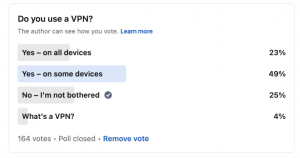
Age and Gender Differences
Just like in the U.S., younger and male users in the UK are more likely to understand and adopt VPNs. Awareness drops sharply among older generations.
| Group | Awareness / Recognition | Strong Understanding |
| 18–24 years | 70% understand well, 17% basic recognition | 70% |
| 25–34 years | 78% awareness (total), 41% clear understanding | 41% |
| 65+ years | 57% awareness (know what VPNs are) | Lowest |
| Men | — | 43% |
| Women | — | 21% |
Devices and Platforms Brits Use for VPNs
VPN usage in the UK is device-driven, with laptops leading the way. Smartphones are increasingly popular, but desktops and tablets lag behind.
- 63% laptops
- 40% smartphones
- 33% desktop computers
- 21% tablets
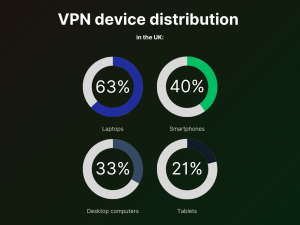
Device distribution shows that VPNs are primarily used on:
- 52% iOS devices
- 37% Android devices
- 6% Windows
- 3% MacOS
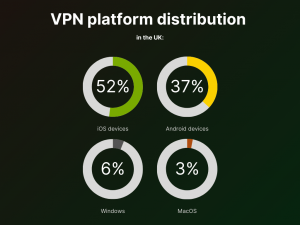
Frequency of VPN Use
Not all VPN users rely on the service equally. Frequency varies significantly depending on the device, with laptops seeing heavier use than mobile devices.
- On laptops/desktops:
- 21% use more than once daily
- 31% daily
- 22% several times a week
- On mobile devices:
- 25% more than once daily
- 15% daily
- 24% several times a week
Why Brits Use VPNs
British users rely on VPNs for both personal privacy and practical tasks like streaming, shopping, and online banking. Workplace and censorship-related use cases are also notable.
- Enhanced online privacy: 39%
- Security on public Wi-Fi: 34%
- Protecting personal data: 33%
- Encryption: 27%
- Accessing geo-restricted content: 24%
- Employer requirement: 24%
- Circumventing censorship: 20%
- Streaming movies/TV: 30%
- File downloads/uploads: 33%
- Online banking: 33%
- Online shopping: 27%
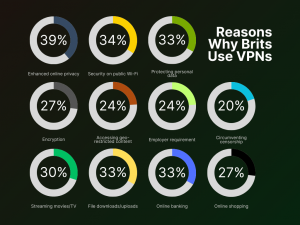
Paid vs. Free VPNs in the UK
While free VPNs remain common in the UK, dissatisfaction with performance is pushing more people toward premium services with better reliability and features.
- 52% of Brits have tried free VPNs.
- Among them, 60% still use free VPNs, while 34% switched to paid due to performance/security issues.
Paid services are valued for:
- Strong encryption (51%)
- Reliable speed (49%)
- Affordable pricing (40%)
- Wide server networks (32%)
- User-friendly design (28%)
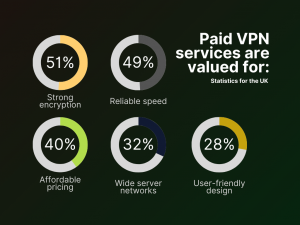
Are VPNs Legal Worldwide?
In most countries – yes, VPNs are completely legal. But in about 15–20 countries, they’re restricted or heavily monitored. These cover:
| Country | Status |
| China | Restricted, approved VPNs only |
| Iran | Limited to government-approved tools |
| Russia | Legal but must comply with censorship; advertising is prohibited |
| UAE | Legal but misuse penalized |
| North Korea | Banned |
| Turkmenistan | Banned |
Thankfully, stealth features like ZoogVPN’s Shadow protocol help users safely overcome these limitations without detection.
Cybercrime Trends in the U.S.
It’s vital to mention that the digital world isn’t getting any safer. According to the FBI’s Internet Crime Complaint Center (IC3), in 2024 the U.S. recorded nearly 860,000 complaints of internet-enabled crime – that’s over 2,000 reports every single day. Reported financial losses reached record levels, rising for 33% compared to 2023. Phishing kits, info-stealing malware, credential stuffing – these threats are part of everyday life online. While a VPN won’t stop all of them (nothing will), it does one job extremely well: it encrypts your data and routes it through secure servers, making it much harder for third parties, or attackers on the same network, to intercept your traffic.
VPN Usage Outlook for 2025 and Beyond
In 2025, VPNs are a basic part of modern digital hygiene which is adopted for everything from binge-watching abroad to shielding your identity from cyber creeps. Whether you’re working remotely, traveling, gaming, or just want peace of mind, the right VPN can satisfy all these needs. And with providers like ZoogVPN offering powerful features at wallet-friendly prices, there’s really no excuse not to protect your digital life. Start using ZoogVPN now and see what a quality VPN service really feels like.


